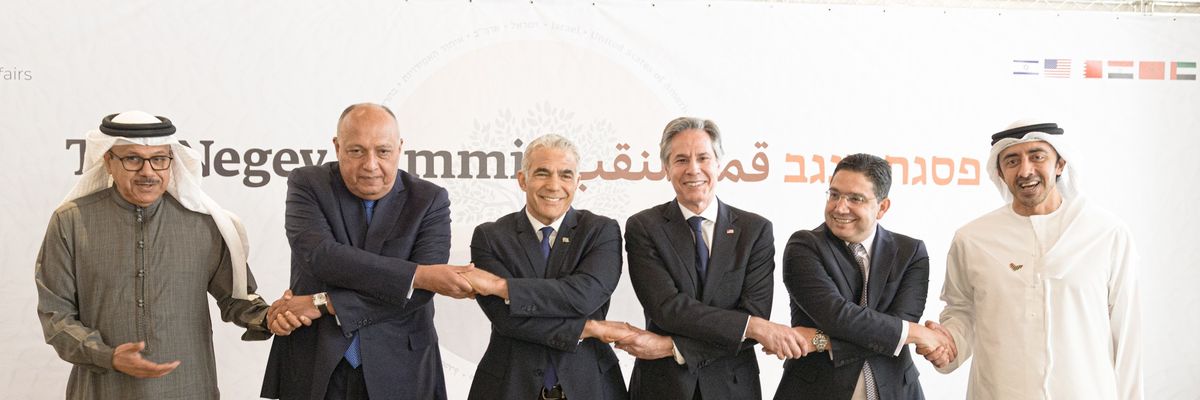Next week President Biden is headed to Saudi Arabia — which he once promised to treat like a “pariah” — reportedly intent on discussing broad security guarantees with the Kingdom, including an air defense umbrella. Unfortunately, the administration’s proposal will deepen U.S. entanglement in the Middle East and further strain Iran nuclear negotiations.
While these security measures and the Abraham Accords — a joint agreement normalizing Arab-Israeli relations — are advertised as stabilizing the region, the reality is that the effects will be the exact opposite if Iran, which is now alarmingly days away from having accumulated enough fissile material to produce an nuclear bomb, continues to be excluded from discussions about Middle East security. If Biden's goal is stability, then his administration must bring all the major regional stakeholders to the table. In addition, Washington should actively encourage ongoing diplomatic talks between Riyadh and Tehran that received a boost just this week.
If Biden maintains his current approach, it will only serve to further isolate Iran and destabilize the entire region for several reasons.
First, in the face of a united U.S.-Arab-Israeli front, Iran will most likely seek to increase its leverage by expanding its nuclear program, investing more in proxy networks, and taking other destabilizing steps to assert its regional influence.
Such a strategy is not new. We’ve seen how isolating Iran can backfire. In an attempt to bring Iran to its knees, the Trump administration abandoned the Iran nuclear deal (formally known as the JCPOA, or Joint Comprehensive Plan of Action), imposed “maximum pressure” economic sanctions, assassinated Iranian Quds Force Commander Soleimani, and designated the Islamic Revolutionary Guard Corps as a Foreign Terrorist Organization. The aftermath of these decisions led to a 400 percent increase in the number of attacks on U.S. troops in Iraq by Iranian proxies.
Second, the U.S. withdrawal from the JCPOA also backfired as Iran can now “produce enough nuclear material for a bomb in less than 10 days — a window so short that Tehran’s actions may not be detected by international inspectors,” according to Kelsey Davenport, Director for Nonproliferation Policy at the Arms Control Association. This should be unacceptable to the international community, and the only real solution is to fully restore the deal and increase this so-called “breakout time” to nearly one year, as it was before Trump pulled out of the JCPOA.
Not only could covert confrontations between Iran and Israel expand to all-out war, but a definitive end to the JCPOA could trigger a nuclear arms race that may include U.S. regional partners like Saudi Arabia, whose Crown Prince Mohammad bin Salman has vowed that “if Iran developed a nuclear bomb, we would follow suit as soon as possible.”
Third, the launch of a new U.S.-Arab-Israeli defense axis will likely derail Saudi-Iran negotiations. Saudi Arabia and Iran broke diplomatic ties in 2016 following Saudi Arabia’s execution of prominent Shia Muslim cleric Nimr al-Nimr and the subsequent attack by Iranian protesters on the Kingdom’s embassy in Tehran. The two rivals have recently engaged in five rounds of direct diplomatic talks hosted by Iraq to resolve regional disputes. Rather than promoting detente between Riyadh and Tehran, whose rivalry drives so much of the tension in the Middle East, a U.S.-Israeli air defense umbrella over their de facto Arab allies will escalate regional tensions and diminish prospects for stability. If Washington intends to create stability, it should step back and allow Saudi Arabia and Iran to heal old wounds.
But Congress is not helping.
The recently introduced bipartisan Deterring Enemy Forces and Enabling National Defenses Act expands on the Middle East air defense proposal. This bill requires the Pentagon to integrate air and defense missile capability for joint security cooperation between the United States and Saudi Arabia, and neighboring Arab states. The bill also reinforces the dated and flawed security architecture for the Middle East — one that aims to pit Arab countries against Iran, perpetuating the cycle of regional conflict. The bill would require American taxpayers to spend even more on Saudi Arabia’s national defense at a time when the Saudis have done next to nothing to substantially increase oil production and thus lower the prices American taxpayers are paying at the pump.
Congress aside, the Biden administration seeking stability in the Middle East is admirable. However, pursuing dated policies that more closely ally the United States with a handful of authoritarian actors is shortsighted and will aggravate tensions with Iran.
Instead, the White House should be looking to avoid an unnecessary quagmire by pursuing diplomacy with Tehran and encouraging bilateral negotiations between Saudi Arabia and Iran. Only then will a process of regional stabilization take root.
















